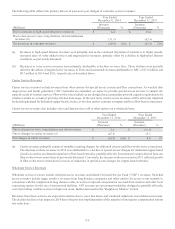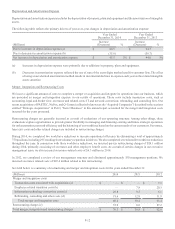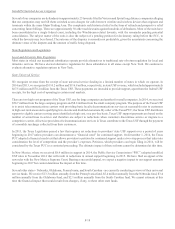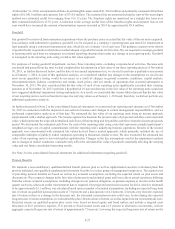Windstream 2014 Annual Report Download - page 134
Download and view the complete annual report
Please find page 134 of the 2014 Windstream annual report below. You can navigate through the pages in the report by either clicking on the pages listed below, or by using the keyword search tool below to find specific information within the annual report.
F-18
IntraMTA Switched Access Litigation
Several of our companies are defendants in approximately 25 lawsuits filed by Verizon and Sprint long distance companies alleging
that our companies may not bill them switched access charges for calls between wireline and wireless devices that originate and
terminate within the same Major Trading Area. The complaints seek historical relief in the form of refunds and prospective relief
concerning future billings. There are approximately 50 other such lawsuits against hundreds of defendants. Most of the suits have
been consolidated in a single federal court, including the Windstream related lawsuits, with the remainder pending potential
consolidation. The subject matter of the suits is also the subject of a pending petition for declaratory ruling before the FCC, to
which the lawsuits may be referred. The outcome of the disputes is currently not predictable, given the uncertainty concerning the
ultimate venue of the disputes and the amount of traffic being disputed.
State Regulation and Legislation
Local and Intrastate Rate Regulation
Most states in which our incumbent subsidiaries operate provide alternatives to traditional rate-of-return regulation for local and
intrastate services. We have elected alternative regulation for these subsidiaries in all states except New York. We continue to
evaluate alternative regulation options in New York.
State Universal Service
We recognize revenue from the receipt of state universal service funding in a limited number of states in which we operate. In
2014 and 2013, we recognized $114.2 million and $116.8 million, respectively, in state USF revenue, which included approximately
$67.5 million and $78.2 million from the Texas USF. These payments are intended to provide support, apart from the federal USF
receipts, for the high cost of operating in certain rural markets.
There are two high-cost programs of the Texas USF, one for large companies and another for small companies. In 2014, we received
$58.7 million from the large company program and $8.8 million from the small company program. The purpose of the Texas USF
is to assist telecommunications carriers with providing basic local telecommunications services at reasonable rates to customers
in high cost rural areas and to qualifying low-income and disabled customers. By order of the Texas PUC, the Texas USF distributes
support to eligible carriers serving areas identified as high cost, on a per-line basis. Texas USF support payments are based on the
number of actual lines in service and therefore are subject to reductions when customers discontinue service or migrate to a
competitive carrier. All service providers of telecommunications services in Texas contribute to the Texas USF through the payment
of a monthly surcharge collected from their customers.
In 2013, the Texas Legislature passed a law that requires set reductions to providers’ state USF support over a period of years
beginning in 2017 unless providers can demonstrate a “financial need” for continued support. On December 1, 2014, the Texas
PUC adopted a financial needs test that allows providers to petition for continued support under a two-step process that takes into
consideration the level of competition and the provider’s expenses. Petitions, which providers can begin filing in 2016, will be
considered by the Texas PUC in a contested proceeding. The ultimate impact of these reforms cannot be determined at this time.
In New Mexico, where we received $8.4 million in support in 2014, the Public Service Commission (“PSC”) adopted modified
USF rules in November 2014 that will result in reductions in annual support beginning in 2015. We have filed an appeal of the
new rules with the New Mexico Supreme Court. Barring a successful appeal, we expect a negative impact to our support amounts
beginning in 2017 but cannot determine the impact at this time.
Several other states - Nebraska, Oklahoma, Pennsylvania, and South Carolina - are currently conducting reviews of their universal
service funds. We receive $13.3 million annually from the Pennsylvania fund, $5.4 million annually from the Nebraska fund, $3.4
million annually from the Oklahoma fund, and $2.1 million annually from the South Carolina fund. We cannot estimate at this
time the financial impact that would result from changes, if any, to these other state funds.
























